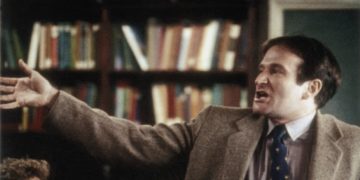It is hard to encapsulate in words the impact that someone I have never met has had on my life. Because the impact in this case is so profoundly intertwined with my aesthetic passion, I felt compelled to write. Compelled, though, not to trump nor add to an already eloquent array of tributes, but instead to offer a personal account of how and why I am feeling the way that I am.
In many senses, my writing is a tribute — an homage to numerous writers whose brilliance has inspired me in moments of disillusionment. It is why, for example, lines from Macbeth occur to me during the course of legal writing, or why a fleeting phrase from Walt Whitman enters my soul in my most downcast of times.
But in this case, I am not referencing poetic inspiration specifically, nor the semblance of poetic license that springs upon me in inopportune or often difficult moments. Rather, I am speaking directly of Robin Williams’ death, and how his dramatic portrayals have inspired me throughout the years.
For years, the film Dead Poet’s Society has had a special place in my heart. It transported me to moments from high school, at Loyola High School of Los Angeles, when I yearned to excel desperately in English class — to find meaning in arcane texts, and summon new, daring interpretations of prose that had already been scrutinized by critics to the point of analytical insanity. Every time I see an image from the film, I remember my days in Dr. Peter M. Wright’s or Terry Caldwell’s English classes — images of myself as a young man, poring over Andrew Marvell’s poetry and torturing the analysis of his Odes in order to fit my misplaced, and indeed “thoroughly wrong-headed,” thesis that Marvell may have been rebuking, rather than extolling, Oliver Cromwell. A scene with Williams reading poetry and ripping Mr. Pritchard’s “Introduction to Poetry” from the book would take me back to Murray Roston’s Literature and Visual Arts seminars where the most beautiful connections were drawn between soaring works of sculpture and beauteous lines of prose. Where conventions were shattered in favor of new emergent perspectives.
Robin Williams’ portrayal of Professor Keating was like a beacon for me — a hope, though seemingly desperate and unpopular, that literature was the key capable of unlocking the mysteries of life; and indeed, that passionate expression and poesy, though disparaged for its archaic relevance, were the very conduits of divine afflatus upon which Truth could soar to new heights of epiphanic edification. I felt overwhelmed with beauty, tears, and love for the impulses of literary creation. When Ethan Hawke stood upon his desk to fight for what he believed in, “O Captain, My Captain!”, Williams turned towards the class, and with that inspired look of overwhelming gratitude, gave his heartfelt approval for acts of conviction and courageousness.
Williams defied my every expectation in that performance. It was the rarest of glimpses into the artistic soul of an actor who reached into his dramatic wellspring to conjure and indeed deliver a performance that was unlike anything he had done before. From that moment on, in tears as the credits rolled, I waited in earnest for Williams to play another role where he would again set aside the frenetic chaos of his associational comedy and espouse that tempered and beautiful side of his soul. It seemed so oddly natural to him. It seemed so apt, so perfect, and indeed so inspiring.
That is when Matt Damon and Ben Affleck realized the brilliance in casting Williams in Good Will Hunting. I have to believe that they felt this potential too. “Look at you, Sean, you fucking burn out,” Will declared, rebuking Williams’ character for remaining morosely introverted and anti-social following his wife’s death. The look on Williams’ face, his soft caring tones, his clothing, his simplicity, that mournful painting, and indeed every nuance and syllable in Williams’ portrayal was pitch perfect. It was Williams’ verisimilitude to the real life torture that only he knew and negotiated which brought this character to life–and which brought me, as an inspired audience member, back to that familiar emotion that I loved from Dead Poet’s Society.
In these two films was the Robin Williams that I adored and cherished. We were apprehending his complex genius. I have watched both films hundreds of times, not just because they are my favorite Robin Williams films, but because they are two of my favorite films of all time. Because the depths of his performances leave me stripped to my core. Alive, yet vulnerable. Sadly inspired.
I remain baffled and dismayed that Robin chose to exit the earth by taking his own life. On suicidal terms. But they are terms that he uniquely negotiated and to which I have no basis nor inclination to judge.
I am left only as a nameless soul in a sea of admiration. Inspired, yet saddened by the loss of a tormented mentor. I feel a loss that is both curious and incalculable. Thank you, Robin, for showing us the dimensions of your soul and the vastness of your artistic beauty. You made this world a better place through your art, and thus, I too now stand atop my desk. In admiration, and in awe.
“O Captain, My Captain,” I salute you. “Once more unto the breach, dear friends.”
What will your verse be…?
Goodnight, and fare thee well, Sir Robin, into the artifice of eternity.
